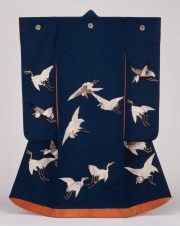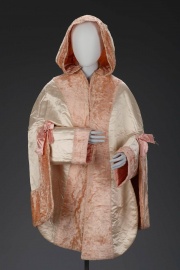Difference between revisions of "Satin"
Jump to navigation
Jump to search
| Line 1: | Line 1: | ||
[[File:11.3808-E9471CR-d1.jpg|thumb|Silk satin kimono<br>MFA# 11.3808]] | [[File:11.3808-E9471CR-d1.jpg|thumb|Silk satin kimono<br>MFA# 11.3808]] | ||
== Description == | == Description == | ||
| − | [[File:2002.699.1-SC63789.jpg|thumb|]] | + | [[File:2002.699.1-SC63789.jpg|thumb|Satin weave robe<br>MFA# 2002.699]] |
A smooth, shiny fabric made with [[silk|silk]], [[acetate%20fiber|acetate]], or [[rayon%20fiber|rayon]] fibers in a satin weave (see below). Satin fabric was originally made in China from silk. Heavy satin is called duchesse. Satin fabrics are used for linings, book covers, and dresses. | A smooth, shiny fabric made with [[silk|silk]], [[acetate%20fiber|acetate]], or [[rayon%20fiber|rayon]] fibers in a satin weave (see below). Satin fabric was originally made in China from silk. Heavy satin is called duchesse. Satin fabrics are used for linings, book covers, and dresses. | ||
| Line 15: | Line 15: | ||
<gallery> | <gallery> | ||
| − | |||
File:Satin slippers MFA.jpg|Satin slipper's<br>MFA# 50.2680 | File:Satin slippers MFA.jpg|Satin slipper's<br>MFA# 50.2680 | ||
File:Satin robe MFA.jpg|Buddhist priest's robe<br>MFA# 37.613 | File:Satin robe MFA.jpg|Buddhist priest's robe<br>MFA# 37.613 | ||
File:Satin petticoat MFA.jpg|Silk satin petticoat<br>MFA# 52.559 | File:Satin petticoat MFA.jpg|Silk satin petticoat<br>MFA# 52.559 | ||
File:Chinese satin MFA.jpg|Silk satin fragment<br>MFA# 11.165 | File:Chinese satin MFA.jpg|Silk satin fragment<br>MFA# 11.165 | ||
| − | |||
File:52.833-SC15304.jpg| | File:52.833-SC15304.jpg| | ||
</gallery> | </gallery> | ||
| Line 36: | Line 34: | ||
* Art and Architecture Thesaurus Online, http://www.getty.edu/research/tools/vocabulary/aat/, J. Paul Getty Trust, Los Angeles, 2000 | * Art and Architecture Thesaurus Online, http://www.getty.edu/research/tools/vocabulary/aat/, J. Paul Getty Trust, Los Angeles, 2000 | ||
| + | * Hoechst Celanese Corporation, ''Dictionary of Fiber & Textile Technology'' (older version called Man-made Fiber and Textile Dictionary, 1965), Hoechst Celanese Corporation, Charlotte NC, 1990 | ||
| + | * Edward Reich, Carlton J. Siegler, ''Consumer Goods: How to Know and Use Them'', American Book Company, New York City, 1937 | ||
| + | |||
| + | * Hermann Kuhn, ''Conservation and Restoration of Works of Art and Antiquities'', Butterworths, London, 1986 | ||
[[Category:Materials database]] | [[Category:Materials database]] | ||
Revision as of 12:14, 19 October 2020
Description
A smooth, shiny fabric made with Silk, acetate, or rayon fibers in a satin weave (see below). Satin fabric was originally made in China from silk. Heavy satin is called duchesse. Satin fabrics are used for linings, book covers, and dresses.
Satin weave is one of three fundamental fabric weaving patterns along with plain, and twill. Satin weave is made by passing filling yarns over 1 warp yarn then under 4-12 warp yarns. The long filling threads, called floats, produce a smooth shiny surface, but are susceptible to snags. Examples of satin weave fabrics are satin, Venetian cloth, and messaline.
See also Sateen weave.
Synonyms and Related Terms
satin fabric; satin weaver; aceytuni; duchesse; raso (Esp.)
Additional Images
Resources and Citations
- G.S.Brady, Materials Handbook, McGraw-Hill Book Co., New York, 1971 Comment: p. 722
- Rosalie Rosso King, Textile Identification, Conservation, and Preservation, Noyes Publications, Park Ridge, NJ, 1985
- Matt Roberts, Don Etherington, Bookbinding and the Conservation of Books: a Dictionary of Descriptive Terminology, U.S. Government Printing Office, Washington DC, 1982
- Fairchild's Dictionary of Textiles, Phyllis G.Tortora, Robert S. Merkel (eds.), Fairchild Publications, New York City, 7th edition, 1996
- Art and Architecture Thesaurus Online, http://www.getty.edu/research/tools/vocabulary/aat/, J. Paul Getty Trust, Los Angeles, 2000
- Hoechst Celanese Corporation, Dictionary of Fiber & Textile Technology (older version called Man-made Fiber and Textile Dictionary, 1965), Hoechst Celanese Corporation, Charlotte NC, 1990
- Edward Reich, Carlton J. Siegler, Consumer Goods: How to Know and Use Them, American Book Company, New York City, 1937
- Hermann Kuhn, Conservation and Restoration of Works of Art and Antiquities, Butterworths, London, 1986






